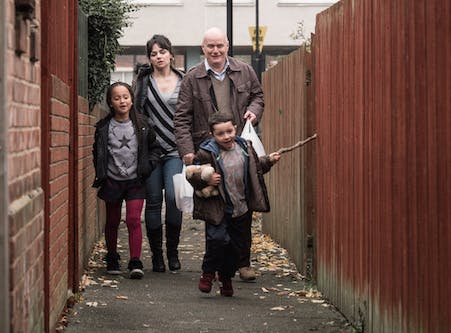At the ripe old age of 53, Hollywood director Quentin Tarantino has been railing for some years now about the law of diminishing returns that comes with working well into one’s dotage. “I don’t want to be an old-man filmmaker,” he once said, “[someone] making old-man movies who doesn’t know when to leave the party.” Tarantino described this older self as an “autumn dude”, and when one looks at the last-furlong career arcs of many legendary auteurs – how many can even name the last films by Billy Wilder, Federico Fellini, Akira Kurosawa? – his fears would seem justified. Yet just a few weeks shy of his 80th birthday, and 50 years after his first landmark TV drama Cathy Come Home, Britain’s Ken Loach returned to the Cannes film festival with a film that would not only take home the Palme D’Or, it would also reverberate throughout the world, winning audience awards at festivals in Locarno, San Sebastian, Vancouver and Stockholm.
But nowhere did I, Daniel Blake have more impact than the UK, where it received its own day – November 17 – and is currently chasing an astonishing £3m at the box office, with stories of audiences erupting into spontaneous applause at their local cinemas, even when the filmmakers haven’t been there to appreciate it. The film’s ad campaign spotted this early on, encouraging cinemagoers to share their reactions and sending the hashtags #IAmDanielBlake and #WeAreAllDanielBlake viral. Says the film’s producer Rebecca O’Brien, “So many people identify with the story that it’s almost got a life of its own now. People are finding themselves through the film – they’ve been silenced by the system, but the film has given them a voice.”
Even more impressively, the film has gone on to affect government policy. Though perhaps not as forcefully as Cathy Come Home – a story of a working-class couple forced into poverty and homelessness that raised questions in parliament and brought changes in UK law – I, Daniel Blake nevertheless forced the powers that be to confront the bleak reality facing the country’s jobless. Opposition leader Jeremy Corbyn called it “one of the most moving films I’ve seen”, and even Iain Duncan Smith, the former Secretary of State for Work and Pensions whose controversial ‘reforms’ are explicitly challenged in the film, was forced to concede that it was “a human story full of pathos and difficulty”.
All of which makes I, Daniel Blake sound like a work of angry agitprop, but, at its heart, Loach’s film is simply the gentle tale of an unlikely friendship between two people striving to survive. One is the title character (Dave Johns), a carpenter recovering from a heart attack whose welfare payments are cancelled after being judged fit for work. The other is Katie (Hayley Squires), a southern single mother forced to move north to house her young family. Together they have to navigate the bureaucratic horrors of the British benefits system, a soul-sapping combination of hoops and sanctions that drive them both to breaking point.
Significantly, though both characters are fictional, the actors based them on myriad real-life cases. “Katie is a version of hundreds of real life women,” says Squires. “They’re actually living through what she experiences in the film. So it was important to give everything I could to it. And I just hope that I’ve given her the conviction she deserves.” And for Johns, the film is about something more than just Daniel and Katie. “It’s about austerity,” he says. “It’s about the working person getting shafted again, getting blamed for everything. And what’s happening is that people are getting tired of this now. This film is making people cry, it’s making them angry. And things can change with the will of the people.”
For Ken Loach, however, it is simply business as usual, a testimony to his relevance and quiet refusal to mellow with age and become that “autumn dude” of Tarantino’s nightmares. In fact, the success of I, Daniel Blake immediately calls to mind something Loach said long ago, when discussing his 1965 TV adaptation of Nell Dunn’s gritty drama Up The Junction. “We were very anxious for our plays not to be considered dramas,” he said, “but as continuations of the news.” Over half a lifetime later, the same is still true.
Words: Damon Wise




